Publications
All publications
Read more about our learning from Farm Africa's programmes in our publications.
Filter by:
Country
Kenya
Key focus areas
Boost productivity
Boost youth employment
Increase incomes
Impact stories from the YISA programme
A collection of stories from the Youth in Sustainable Aquaculture, a partnership programme with the Mastercard Foundation and consortium partners led by Farm Africa that aims to strengthen resilient livelihoods through innovative aquaculture practices, enabling work opportunities for young women and men.
Download (3.33mb)
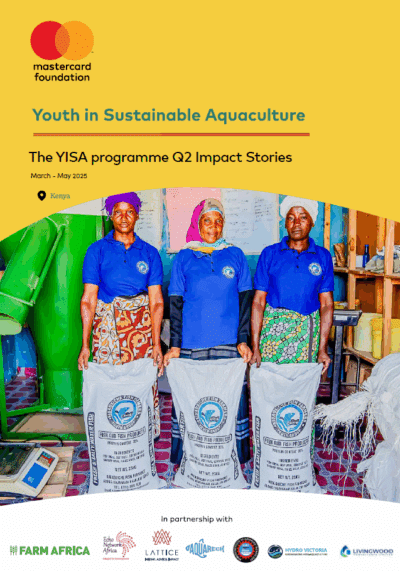
Country
Kenya
Key focus areas
Boost productivity
Boost youth employment
Increase incomes
Country
Regional
Key focus areas
Boost youth employment
Increase food security and nutrition
Increase incomes
Forty years of impact
To mark Farm Africa’s 40th year, past and present Farm Africa project participants share stories of the impact the charity has had on their lives.
Download (767.18kb)
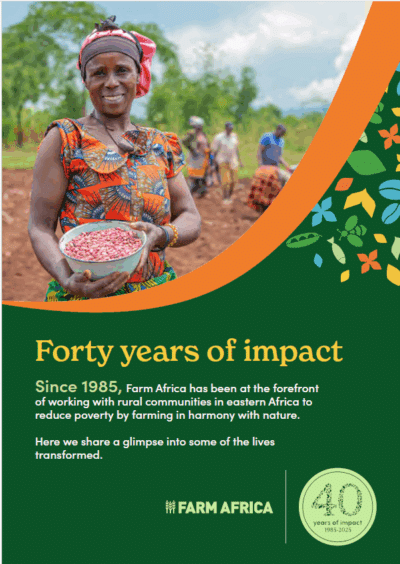
Country
Regional
Key focus areas
Boost youth employment
Increase food security and nutrition
Increase incomes
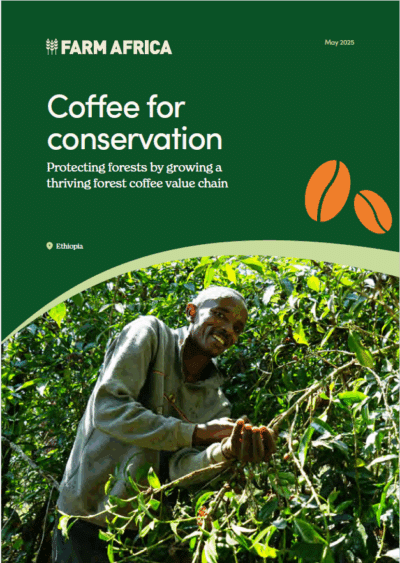
Coffee for conservation: Protecting forests by growing a thriving forest coffee value chain
More info
Country
Ethiopia
Key focus areas
Connect farmers to markets
Increase incomes
Protect ecosystems
Coffee for conservation: Protecting forests by growing a thriving forest coffee value chain
This learning paper describes how a three-year Farm Africa project in the ecologically vital Ilu Ababor Zone of Ethiopia successfully protected natural forests while improving the livelihoods of 4,000 people through sustainable coffee production and alternative income sources.
Download (1.04mb)

Country
Ethiopia
Key focus areas
Connect farmers to markets
Increase incomes
Protect ecosystems
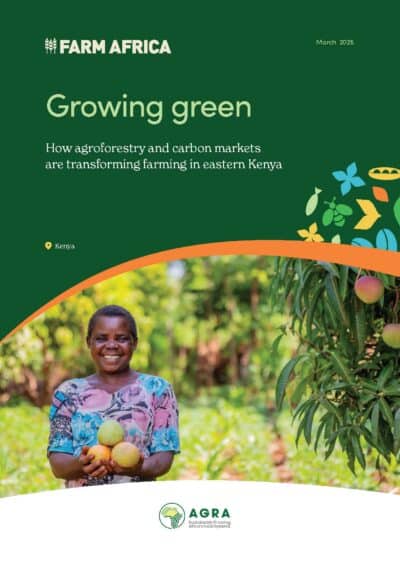
Growing green – how agroforestry and carbon markets are transforming farming in eastern Kenya
More info
Country
Kenya
Key focus areas
Act on climate change
Increase incomes
Protect ecosystems
Growing green – how agroforestry and carbon markets are transforming farming in eastern Kenya
This report charts the progress of more than 21,500 farmers in Embu and Tharaka Nithi counties in eastern Kenya who have planted trees and adopted climate-smart farming techniques.
Download (1.95mb)

Country
Kenya
Key focus areas
Act on climate change
Increase incomes
Protect ecosystems
Country
Kenya
Key focus areas
Empower women
Increase incomes
Strengthen food systems
Growing Resilience And Opportunities for Women (GROW) Roundtable Report
In October 2024, Farm Africa convened a roundtable discussion with female industry leaders in Nairobi, Kenya as part of its Growing Resilience and Opportunities for Women (GROW) initiative. This report summarises the key themes and conclusion of the discussion, which explored women’s role in the global food system and ways to drive positive change.
Download (2.16mb)
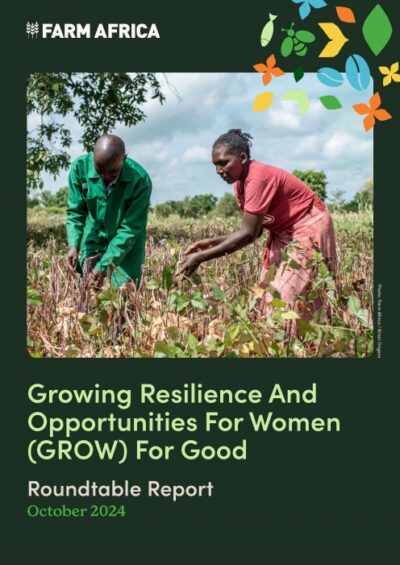
Country
Kenya
Key focus areas
Empower women
Increase incomes
Strengthen food systems
Country
Kenya
Key focus areas
Boost productivity
Increase incomes
Strengthen food systems
The Village-Based Advisor (VBA) model
Agricultural extension services to farmers are vital for enhancing productivity and production of agricultural produce in Kenya. However, the ratio of agricultural extension workers to farmers stands at 1:5,000 compared to the recommended ratio of 1:400. This paper outlines how Farm Africa and AGRA are helping to plug this gap in Embu and Tharaka Nithi counties by creating a network of Village-based Advisors (VBAs) made up of well-informed, passionate farmers who receive specialised training to provide technical extension services, inputs and market linkages to other services to other farmers.
Download (4.21mb)
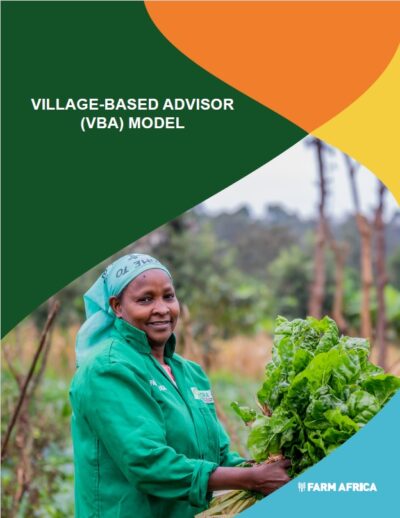
Country
Kenya
Key focus areas
Boost productivity
Increase incomes
Strengthen food systems
Country
Ethiopia
Key focus areas
Boost productivity
Increase incomes
Protect ecosystems
A greener future on a grand scale: a summary of the Bale Eco-region Phase II project
Ethiopia’s Bale Eco-region is an ecologically critical area and also home to many people who depend on its resources for their livelihood. Since 2014, Farm Africa has been leading a consortium to improve livelihoods in the region while ensuring the ecosystem is protected. The first phase of the project developed a management strategy for the region. Phase II (2019-2024), funded by the European Union, has scaled out the strategy to reach over 1.6 million people. This report summarises those Phase II activities and outcomes.
Download (3.96mb)
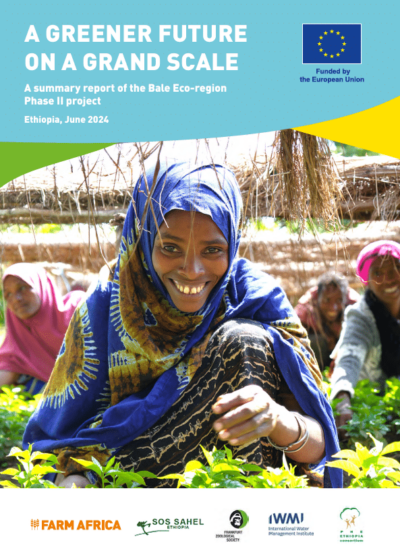
Country
Ethiopia
Key focus areas
Boost productivity
Increase incomes
Protect ecosystems
Country
Ethiopia
Key focus areas
Increase food security and nutrition
Increase incomes
Protect ecosystems
Nature-based Solutions factsheet
A four-page summary of Farm Africa’s Nature-based Solutions for Sustainable and Inclusive Development programme in Ethiopia, funded by Sida. The programme, which runs from 2023 to 2026, aims to sustainably manage forests, conserve biodiversity, build communities’ resilience to climate change and develop sustainable livelihoods through holistic nature-based solutions across six river basins in Ethiopia, clustered into three eco-regions.
Download (4.64mb)
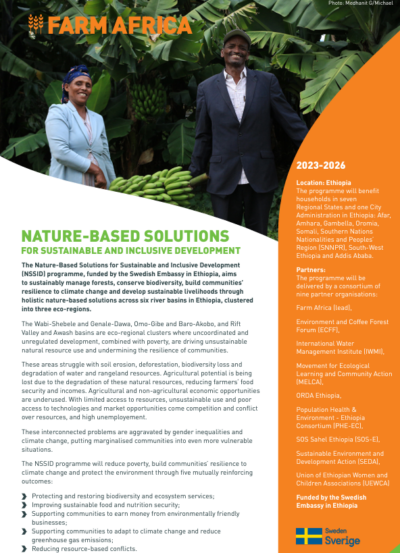
Country
Ethiopia
Key focus areas
Increase food security and nutrition
Increase incomes
Protect ecosystems
Country
Ethiopia
Key focus areas
Boost youth employment
Increase incomes
Protect ecosystems
Eco-tourism opportunity in Ilu Ababor Ethiopia
Although Ilu Ababor Zone in Ethiopia is presently unknown to tourists, a recent scoping study carried out by Farm Africa, Mattu University and Oromia Tourism Commission has found strong potential for sustainable eco-tourism development. This study summary outlines key findings and describes, in detail, 7 priority sites for eco-tourism development consideration.
Download (1.05mb)
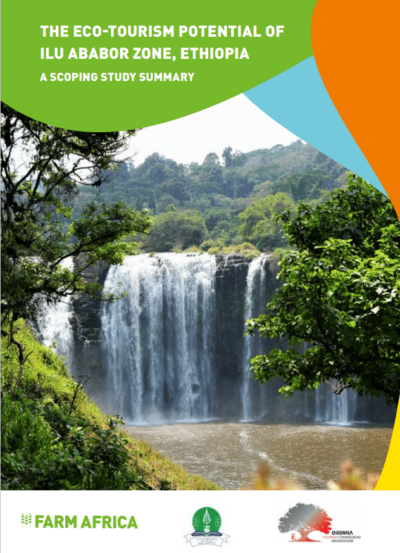
Country
Ethiopia
Key focus areas
Boost youth employment
Increase incomes
Protect ecosystems
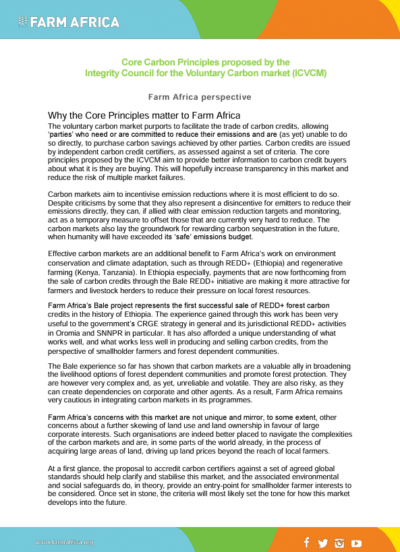
Farm Africa response to the Core Carbon Principles proposed by the Integrity Council for the Voluntary Carbon Market (ICVCM)
More info
Country
DR Congo
Key focus areas
Act on climate change
Increase incomes
Protect ecosystems
Farm Africa response to the Core Carbon Principles proposed by the Integrity Council for the Voluntary Carbon Market (ICVCM)
This PDF is the response Farm Africa submitted in September 2022 to a public consultation on the draft Core Carbon Principles (CCPs) and Assessment Framework (AF) being developed by the Integrity Council for the Voluntary Carbon Market (ICVCM)’s Expert Panel. The CCPs and AF will set new threshold standards for high-quality carbon credits, provide guidance on how to apply the CCPs, and define which carbon-crediting programmes and methodology types are CCP-eligible. The Core Carbon Principles and Assessment Framework will be issued in Q4 2022, following the public consultation, which launched in July 2022.
Download (606.24kb)

Country
DR Congo
Key focus areas
Act on climate change
Increase incomes
Protect ecosystems
Country
Ethiopia
Key focus areas
Increase incomes
Protect ecosystems
Making forests sustainable
Between 2012 and 2021, Farm Africa worked with the NGO SOS Sahel Ethiopia, with funding from the Royal Norwegian Embassy in Ethiopia, to deliver a REDD+ project that lowers greenhouse gas emissions by reducing deforestation in the Bale Eco-region, while also boosting the livelihoods of local communities living in poverty. This document presents key lessons generated by the Phase II of the project, which ran from 2016 to 2021.
Download (4.16mb)
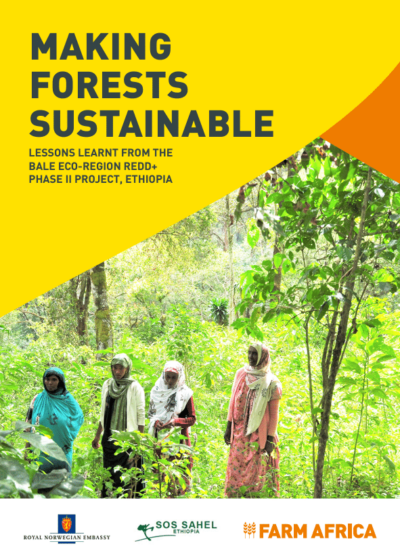
Country
Ethiopia
Key focus areas
Increase incomes
Protect ecosystems
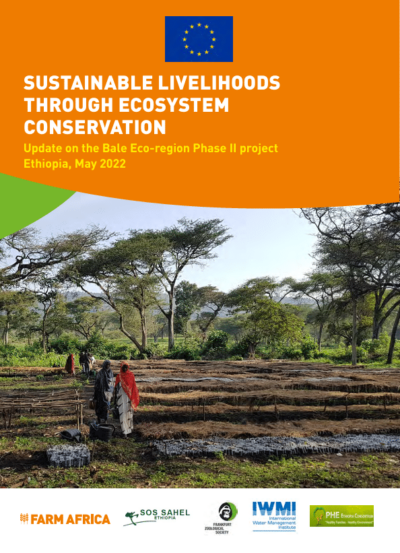
Sustainable livelihoods through ecosystem conservation: Update on the Bale Eco-region Phase II project
More info
Country
Ethiopia
Key focus areas
Boost productivity
Increase incomes
Protect ecosystems
Sustainable livelihoods through ecosystem conservation: Update on the Bale Eco-region Phase II project
The BER phase II project aims to improve the livelihoods of vulnerable people in south-eastern Ethiopia and to protect the environment through an integrated ecoregional development approach. This report gives an update on the achievements of the project and features testimonies from those directly involved.
Download (4.32mb)

Country
Ethiopia
Key focus areas
Boost productivity
Increase incomes
Protect ecosystems
Country
Ethiopia
Key focus areas
Act on climate change
Increase incomes
Protect ecosystems
Livelihoods for Refugees and Host Communities
The project brought refugees and Ethiopian hosts together to address common challenges: environmental degradation, climate change and poverty. The Ethiopian Government provided host and refugee communities with access to previously unused land.
Download (6.07mb)
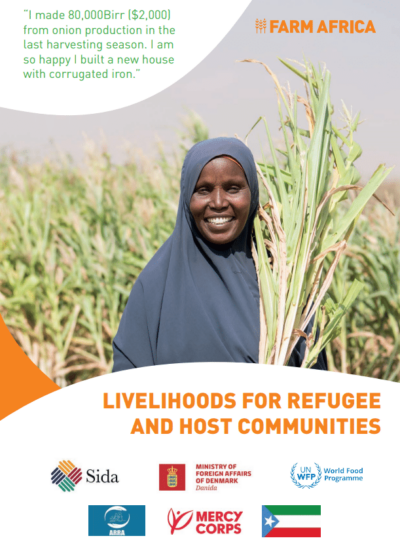
Country
Ethiopia
Key focus areas
Act on climate change
Increase incomes
Protect ecosystems
Country
Ethiopia
Key focus areas
Empower women
Increase food security and nutrition
Increase incomes
Household socioeconomic status and women and children’s dietary diversity
Farm Africa’s Livestock for Livelihoods project helped Ugandan and Ethiopian pastoralist women set up sustainable, small-scale goat-rearing enterprises. This booklet examines the factors that improve dietary diversity in women and children, including women’s economic empowerment, production of food crops and the size of livestock herds.
Download (7.2mb)
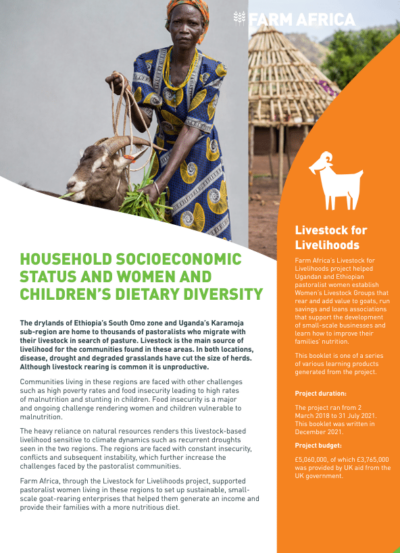
Country
Ethiopia
Key focus areas
Empower women
Increase food security and nutrition
Increase incomes
Country
Ethiopia
Key focus areas
Empower women
Increase food security and nutrition
Increase incomes
Goat husbandry by pastoralist communities
Farm Africa’s Livestock for Livelihoods project helped Ugandan and Ethiopian pastoralist women set up sustainable, small-scale goat-rearing enterprises. This booklet examines the factors affecting the adoption of good goat husbandry practices such as the provision of housing for goats, improved feeding practices, fodder production and using services from animal health workers.
Download (2.1mb)
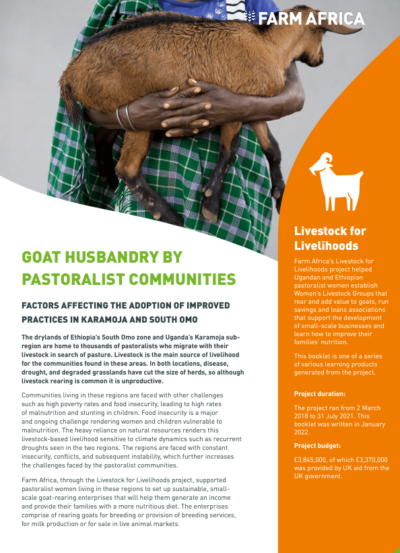
Country
Ethiopia
Key focus areas
Empower women
Increase food security and nutrition
Increase incomes
Country
Ethiopia
Key focus areas
Act on climate change
Increase incomes
Protect ecosystems
Forests for sustainable development factsheet
Factsheet on Forests for sustainable development programme, which aims to contribute to the sustainable conservation of natural forests, biodiversity and ecosystem services in the Bale Eco-region and associated landscapes in Guji and Borena zones in Oromia, Ethiopia through interventions that reduce deforestation and biodiversity loss, increase household incomes and resilience of the local community, and improve governance for integrated landscape management.
Download (673.28kb)

Country
Ethiopia
Key focus areas
Act on climate change
Increase incomes
Protect ecosystems
Country
Ethiopia
Key focus areas
Empower women
Increase food security and nutrition
Increase incomes
Community Animal Health Workers
Farm Africa’s Livestock for Livelihoods project helped Ugandan and Ethiopian pastoralist women set up sustainable, small-scale goat-rearing enterprises. This four-page booklet outlines how the project created and strengthened a network of community animal health workers (CAHWs) linked to agro-input dealers to enhance pastoralists’ access to quality animal health services.
Download (860.17kb)
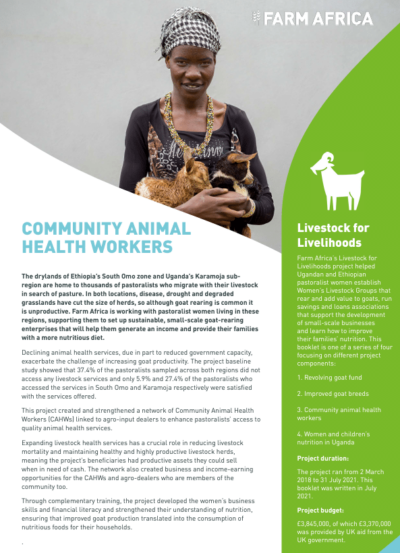
Country
Ethiopia
Key focus areas
Empower women
Increase food security and nutrition
Increase incomes
Country
Ethiopia
Key focus areas
Empower women
Increase incomes
Revolving Goat Fund
Farm Africa’s Livestock for Livelihoods project helped Ugandan and Ethiopian pastoralist women set up sustainable, small-scale goat-rearing enterprises. This four-page booklet outlines how Farm Africa set up a revolving goat scheme across South Omo and Karamoja. The scheme required each woman who received does (female goats) from Farm Africa to give does to another vulnerable woman once her herd had grown, creating a cycle of improved prosperity.
Download (799.73kb)
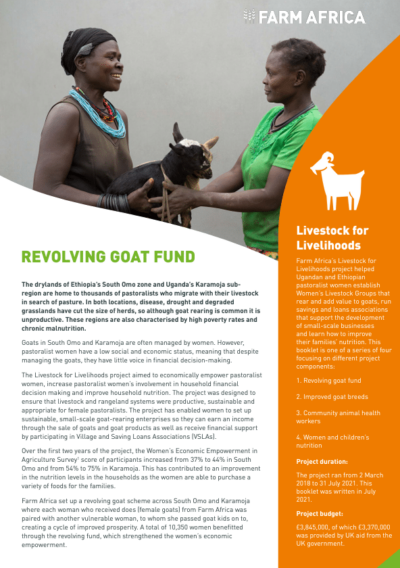
Country
Ethiopia
Key focus areas
Empower women
Increase incomes

